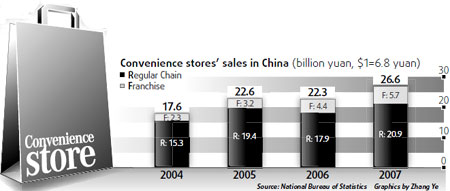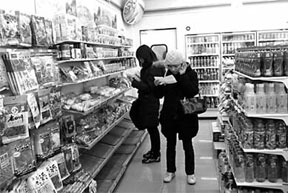

|
7-Eleven will open its first outlet in Shanghai in April. Wang Jing |

Noon is the busiest time of the day for Li Sen, a cashier at a 7-Eleven convenience store in Beijing. Office workers, college students and foreign expatriates from nearby neighborhoods flock to the store to grab a bite for lunch.
"Business has been good since we opened last Christmas," Li said. "Our self-made food and snacks are popular and liquors sell well too."
While other retail formats such as department stores and supermarkets are reporting declining sales in the global economic downturn, 7-Eleven, the world's largest convenience store chain, has seen profit gains.
Seven & I Holdings, the parent company of 7-Eleven, posted a 7.9 percent rise in profit gain for the quarter ending in November, largely helped by its convenience store business worldwide as a growing number of consumers start buying food at nearby stores instead of eating out.
Its rival, Lawson, another chain store giant, also reported a profit rise of 14.8 percent to $152.2 million for the quarter.
Adding stores in China is a key strategy to increase earnings in the coming year for both companies.
7-Eleven will open its first outlet in Shanghai in April, targeting high-end consumers in major commercial districts. Taiwan-based President Chain Store Corporation, will operate the business and plans to open 100 stores in the city in the next three years.
Convenience stores, a relatively new retail concept in China, experienced tough times in recent years as consumers proved reluctant to stop buying food at mom-and-pop stores and local supermarkets such as Jingkelong and Wumart.
Shanghai Hualian Supermarket Corp, one of China's biggest retailers, closed one-third of its Beijing convenience stores due to poor operation and huge losses.
But Chinese people's slow acceptance of convenience stores did not hold back 7-Eleven's expansion in the country.
The company said it tries to stay competitive by selling private label products, offering a clean, bright environment and good in-store service and targeting different consumers in different locations.
"Our outlets choose the products they sell so that they can better meet the consumers' demand within their areas," said Zhang Hongping, a public relation officer of 7-Eleven Beijing Corporation.

7-Eleven entered the Chinese market in 1992 by opening its first store in Shenzhen, Guangdong province. It now operates about 400 stores on the Chinese mainland. The company expanded its business to the north by opening its first Beijing store in 2004. So far it has about 70 outlets in the capital, all directly owned by the company.
But most 7-Eleven stores in Beijing only sell food, magazines and daily necessities and do not provide services such as mail and EMS as they do in other markets.
"We will definitely work on that in the future and we hope to offer credit card payment services in all our stores in Beijing soon," said Zhang.
The company said it will continue to add more outlets in Beijing in 2009 and find opportunities for franchise licensing.
"Franchising is our ultimate goal. But before that we have to make sure that the current model continues to grow," Zhang said.
(China Daily 03/16/2009 page9)













